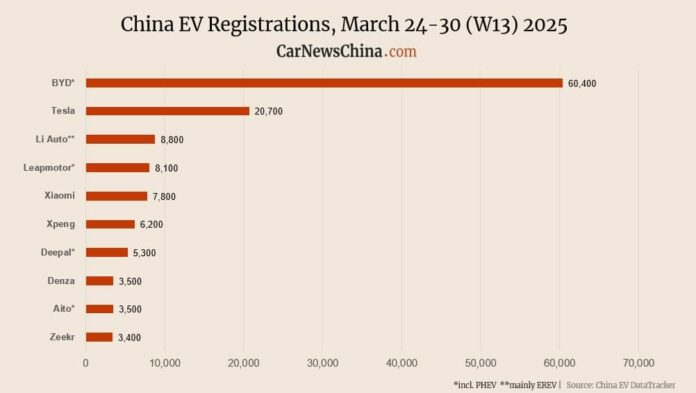In the last week of February, the Chinese EV market was mainly up, with several exceptions. BYD was slightly up 3%, Xiaomi was up 18%, Nio 25%, and Tesla 22%, while Xpeng was down 17% compared with the week before. Nio’s Onvo registered 1,400 units.
483,000 passenger cars were registered in China, up 8.3% from the same period last year. The EV penetration rate was 50.1%, as 242,000 electric vehicles were registered, up 24.1% from the same period last year.
The weekly sales were published by Li Auto. However, Li Auto ceased publishing them last week after the China Association of Automobile Manufacturers (CAAM) “recommended” that Li Auto, the media and any third parties end it. CAAM says weekly data “undermines the industry order” and “fuels vicious competition.” Li Auto has now published only its own EV registration.
The weekly data are used by consultants, analysts, or investors to see the sales trend and forecast monthly deliveries. They show how many cars were registered for road traffic, which can be later compared with automakers’ self-reported monthly sales, which, unlike registrations, include cars for showrooms, test cars, and other uses.
China-controlled media have followed CAAM’s recommendation to stop publishing weekly figures. However, as an independent source of information on the Chinese auto market since 2010, CarNewsChina continues to publish weekly insurance registrations, sourced from China EV DataTracker.
The numbers are rounded and present new energy vehicle (NEV) sales, the Chinese term for BEVs, PHEVs, and EREVs (range extenders). To be completely precise, it also includes hydrogen vehicles (FCEVs), but their sales are almost non-existent in China.
Week 13 of 2025 (W13) was between March 24 and 30.
BYD led the week with 60,400 insurance registrations in China, rising 3.2% from 58,500 units the previous week. In the first four weeks of March (March 3-30), BYD registered 239,100 vehicles in China. This includes only BYD-badged cars, not its subbrands.
BYD’s brand Denza saw 3,500 registrations, jumping 45.8% from 2,400 units the previous week.
BYD sold 4.3 million vehicles in 2024 and is expected to deliver around 5.5 million units in 2025. In April 2022, BYD ceased production of ICE-only vehicles and focused solely on EVs.

Tesla followed with 20,700 registrations, increasing 21.8% from 17,000 units a week earlier. Of these, 14,600 were new Model Y registrations and 6,100 were Model 3 sedan registrations. For Tesla, this is the fifth consecutive week of rising sales in China.
In the first four weeks of March (March 3-30), Tesla registered 66,800 vehicles in China.

Li Auto recorded 8,800 registrations, up 2.3% from 8,600 units the previous week. In the first four weeks of March (March 3-30), Li Auto registered 32,600 vehicles in China.
Li Auto sells mainly EREV SUVs. Last year, it launched its first all-electric car, Li Mega. However, the sales were disastrous for the coffin-like vehicle. In response, Li Auto delayed the launch of another all-electric model to Q2 2025 – it will be an all-electric SUV, Li Auto i8, which was already teased in spy shots.
Volkswagen-backed Xpeng posted 6,200 registrations, down 17.3% from 7,500 units the week before. In the first four weeks of March (March 3-30), Xpeng registered 29,200 vehicles in China.
Xpeng’s monthly delivery volume has exceeded 30,000 vehicles for the fifth consecutive month as the company announced 33,205 delivered units in March. The Mona M03 entry-level sedan has powered its deliveries, contributing about half of the sales in the last three months. Mona M03 recently reached 100,000 produced units, 216 days after the launch.
Stellantis-backed Leapmotor saw 8,100 registrations, rising 17.4% from 6,900 units the previous week. In the first four weeks of March (March 3-30), Leapmotor registered 27,900 vehicles in China.
Xiaomi reported 7,800 registrations, up 18.2% from 6,600 units the previous week. In the first four weeks of March (March 3-30), Xiaomi registered 27,100 vehicles in China.
Deepal recorded 5,300 registrations, growing 3.9% from 5,100 units a week earlier.
Zeekr posted 3,400 registrations, increasing 13.3% from 3,000 units the previous week.
Nio registered 3,000 vehicles, up 25.0% from 2,400 units the week before. In the first four weeks of March (March 3-30), Nio registered 9,300 vehicles in China.

Nio’s Onvo posted 1,400 registrations, up 16.7% from 1,200 units the previous week. In the first four weeks of March (March 3-30), Onvo registered 5,000 vehicles in China.
Onvo sells a single model, an L60 SUV, launched in September 2024 to compete with the Tesla Model Y. Its initial monthly sales target was to reach 10,000 units in December and 20,000 in March. The December target was achieved with little help from selling cars to its own employees. However, the 20,000 units target for March wasn’t met.
Together, the Nio Group registered 4,400 vehicles, up 22% from 3,600 units the week before. In the first four weeks of March, Nio Group registered 14,300 vehicles in China.
Nio Group’s sales target is about 440,000 vehicles in 2024, of which Onvo should contribute half. Last year, the company delivered 220,000 vehicles.

Aito posted 3,500 registrations, rising 52.2% from 2,300 units a week earlier.
Avatr recorded 1,900 registrations, up 5.6% from 1,800 units the previous week.
Luxeed saw 2,100 registrations, increasing 23.5% from 1,700 units a week earlier.

Update 4:14 pm (China Time): Nio Group registered 14,300 units, not 10,300, in the first four weeks of March.
Recommended for you

China EV registrations in week 12: Nio 2,400, Xpeng 7,500, Tesla 17,000, BYD 58,500

China EV registrations in Week 11: Nio 2,000, Xpeng 7,000, Tesla 15,300, BYD 62,800

China EV registrations in Week 10: Nio 1,900, Xpeng 8,500, Tesla 13,800, BYD 57,400


